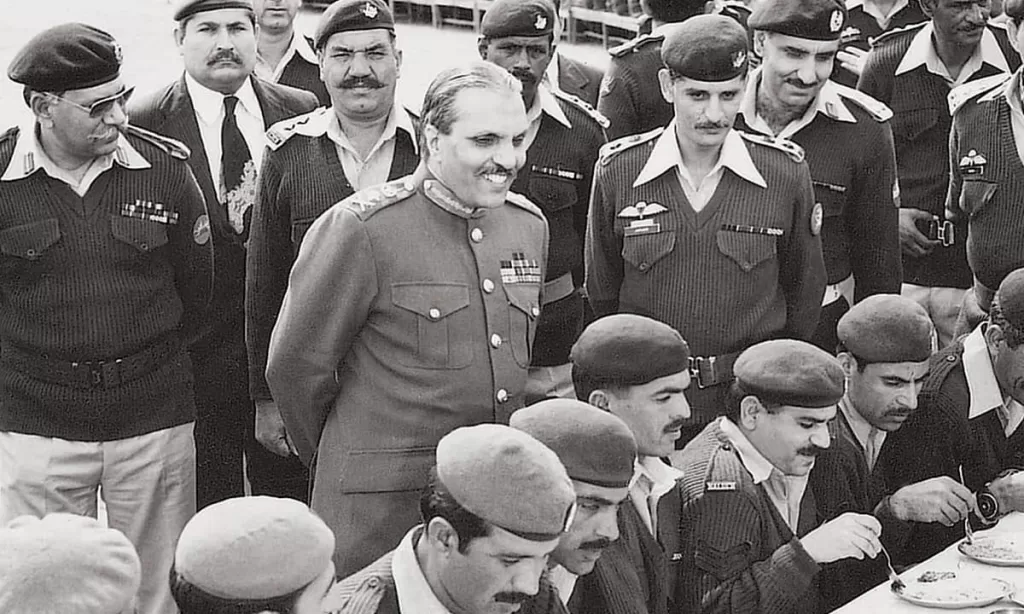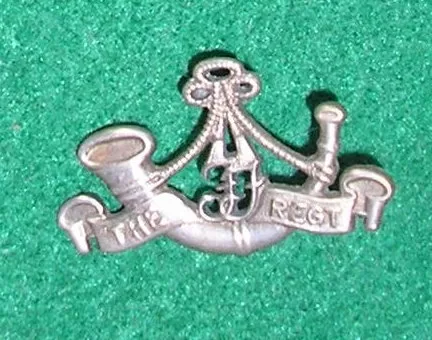Abdullah, a young army officer met a charming lecturer, Anjum at Peshawar University. They decided to travel the brief journey of life together and married. Abdullah Saeed was son of Dr. Saeed Ahmad Khan (1900-1996) of Abbottabad. In early part of twentieth century, the Indians were trained at the newly established medical schools and Dr. Saeed was among the early pioneers. When he was at medical school, he developed tuberculosis and became so sick that he missed a year of study. This may have been the reason that he focused on chest diseases and tuberculosis. He served as the superintendent of tuberculosis sanatorium at Dadar near Abbottabad from 1939 to 1964 – this was the largest tuberculosis sanatorium in India. His son Abdul Haee Saeed followed in his father’s footsteps and became a lung specialist in Pakistan.
Abdullah was commissioned in 6 Frontier Force (FF) Regiment after passing out from first Pakistan Military Academy (PMA) course in 1948. He steadily climbed the ladder of promotion and shined at different stages of his career. He served as Adjutant at PMA Kakul, instructor at infantry school Quetta and Directing Staff (DS) at staff college Quetta. He also went to the United States for a course at Infantry School Fort Benning, Georgia. As a young officer, he was a good athlete, a foot ball player and kept himself physically fit (no bulge) till his retirement. He commanded 1 FF (in my view he was not given the command of his parent battalion due to poor relationship between Abdullah and a 6 FF patriarch Lieutenant General Atiq ur Rahman) and later raised and commanded 26 FF. He served as commandant of Pakistan Military Academy at Kakul in early 1970s. On promotion to Major General rank, he was appointed General Officer Commanding (GOC) of 33rd Division based in Quetta, then operating under V Corps based in Karachi. In 1970s, when the Balochistan insurgency gained momentum, 33rd Division expanded as other formations were transferred to Balochistan to battle the insurgency.
Abdullah was a humble man and had a very simple life style. V Corps commander had his temporary office at GOC office in Quetta. Abdullah was advised to set up a separate office of his own but he used a smaller office of his Colonel Staff. Pomp and show was not his way of doing things. He used to keep a plaque on his desk with the inscription ‘Al Azmat O’Lillha’ ‘greatness is for God only’. He was a man with high aesthetics who loved Urdu poetry and often quoted verses from Iqbal, Faiz Ahmad Faiz, Ahmad Faraz and other poets. Anjum was a mirror image of her husband. She always had a kind demeanor and treated all with respect and affection. In the morning, when the driver with staff car would come to pick up Abdullah, she made sure that the driver was served tea.
After 1977 Martial Law, Abdullah became Martial Law administrator of Balochistan province; essentially the supreme authority of the province. This didn’t change the behavior of Abdullah and Anjum. Sometimes small things show the true worth of an individual. Abdullah was in charge of Balochistan province while his colleague and old course mate at PMA Lieutenant General Fazal-e-Haq was Martial Law administrator of North West Frontier Province (NWFP). Anjum went to Peshawar to visit her family and carried on in her usual way not using any official transport. She hopped on a rickshaw to visit her aunt. The rickshaw turned over and she broke her collar bone and she returned to Quetta with her arm in a sling. Neither Abdullah nor Anjum thought about the use of even legitimate perks and privileges associated with high office. Their three young children walked up to the school bus stop in the summer heat and bitter cold of Quetta and waited with other children to go to school. He never let his official vehicles to be used for school drop/pick up. He never used his high office for any personal gain. After retirement, when he was ambassador, his children worked odd jobs to support their studies.
Abdullah was an Ahmadi; a heterodox sect of the Sunni branch of Islam that was declared non-Muslim by the Pakistani State in 1974. The treatment of this community in Pakistan is the most shameful chapter of bigotry in modern times and a blot on the collective conscience of the nation. Ahmadis were hounded and their faith became the obstacle in advancement in all aspects of their career and later many were killed by mob violence. Even in most painful times, Abdullah kept his sense of humor. When Ahmadis were declared non-Muslims, his friend and fellow PIFFER Major General Ghulam Jilani (later Lieutenant General) nick named Jil visited him in Quetta. Abdullah told him “Jil, now that we have been declared non-Muslim, you have to help me out how I should greet you when we meet. Should I say Namaste or Sat Sri Akal to you?”

Chief of Army Staff (COAS) and President General Muhammad Zia ul Haq had great regard for Abdullah and considered him a competent and professional soldier. He frankly confided with him that ‘Abdullah I know you deserve to be promoted but you know that I can not’ referring to Abdullah’s Ahmadi faith. Zia offered him governorship of Balochistan on supersession and retirement but Abdullah declined the offer stating that ‘Sir, if you can not trust me with the command of a Corps, how can you trust me with the administration of a province’. He was appointed ambassador to Mexico and Cuba after supersession and retirement.
Imagine the feelings of Dr. Saeed Ahmad Khan. He cared for the sickest and most vulnerable compatriots at a tuberculosis sanatorium for three decades and then ran free clinic for the poor after retirement. He sent his young son on the front in 1965 and 1971 wars, ready to sacrifice the life of his dear son for the country. In return, in 1974, a mob attacked his house, burned down his clinic, injured his son-in-law and forced him to leave his ancestral home. All this happened when his son was commanding a division of Pakistan army and was in charge of a province of the country.
He left the country with a broken heart. He developed colon cancer and died in the United States in April 1988 at a relatively young age. Anjum also developed cancer and died soon after Abdullah’s death. When asked how he felt about settling in United States, he replied, “I would rather be a second rate citizen in a first rate country than a third rate citizen in a second rate country.” I think, Abdullah didn’t die of cancer but of a broken heart and this one sentence summarizes the pain and dilemma of the soldier who stands up to sacrifice his life for the country and the country in turn persecutes and hounds him for his beliefs.
Imagine the feelings of Dr. Saeed Ahmad Khan. He cared for the sickest and most vulnerable compatriots at a tuberculosis sanatorium for three decades and then ran free clinic for the poor after retirement. He sent his young son on the front in 1965 and 1971 wars, ready to sacrifice the life of his dear son for the country. In return, in 1974, a mob attacked his house, burned down his clinic, injured his son-in-law and forced him to leave his ancestral home. All this happened when his son was commanding a division of Pakistan army and was in charge of a province of the country. All this was done because his countrymen didn’t approve of his beliefs. If this is not madness then only God knows the definition of this word. Pakistan and its army can be proud of men like Abdullah Saeed; thoroughly professional, upright and at the same time serving with dignity and humility.
Acknowledgement: Author thanks many for their valuable input. Conclusions, errors and omissions are author’s sole responsibility.




